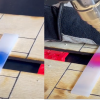C&C • Creativity & Cognition (2025)
[UG Research] ThermAssist
Augmenting Heat Perception in Plastic Thermoforming Using Colorimetric Spray-on Diacetylene Polymer Sensors

Description
The practice of thermoforming plastics relies on understanding temperature effects. While simulations can predict these effects with precise material and equipment parameters, they often fail to communicate experiential knowledge of how different materials and processes interact. Tactile feedback and visual cues are central to determining whether a material is malleable, a skill that simulations cannot replicate. Our work explores the use of a heat-sensitive spray-on smart material made from Polydiacetylene (PDA) to improve heat perception. This sensor exhibits reversible colorimetric changes in response to temperature variations from 100ºC to 200ºC, acting as a visual cue perceivable by humans. This study evaluates PDAs' sensitivity, accuracy, and practicality in real-time temperature monitoring during vacuum forming and acrylic bending. Our findings demonstrate that PDA based sensors enhance visibility of material dispersion, provide safeguards to critical temperatures, and illustrate heat flow and conductivity, thereby improving accessibility, literacy, and relationships with materials in thermoforming practices.





